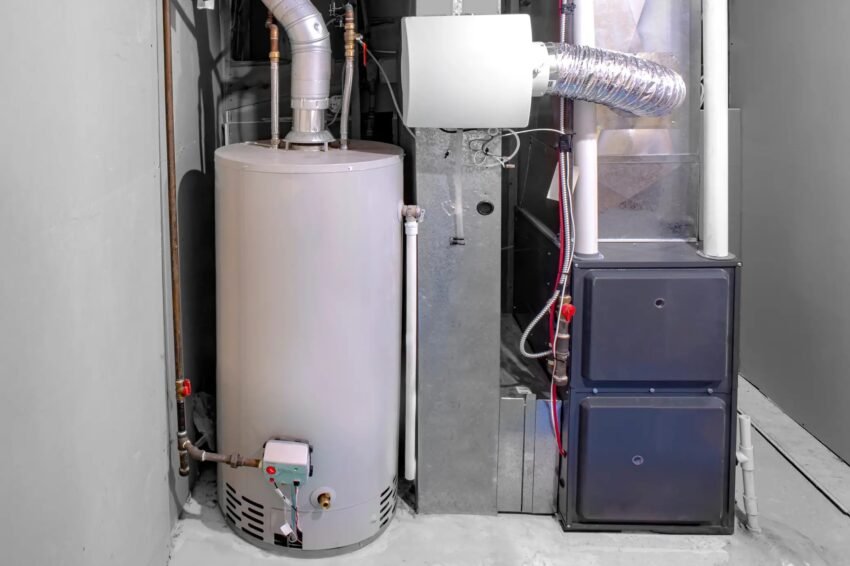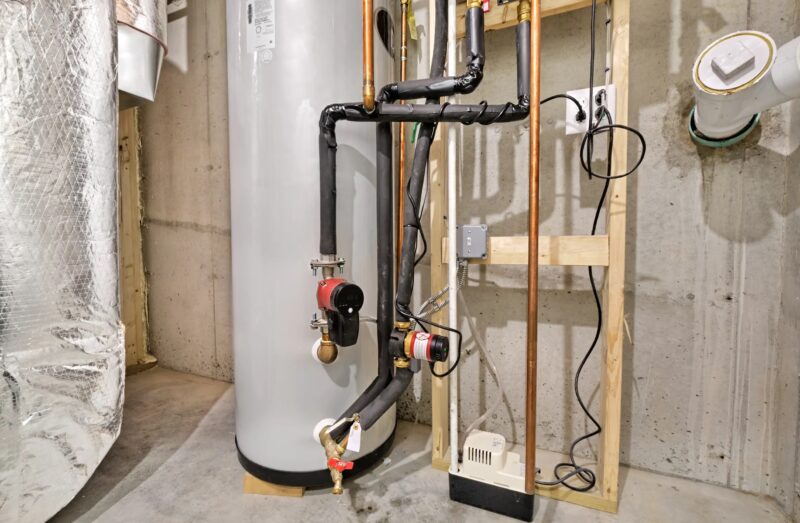
The average water heater replacement cost is $1,300, depending on the size, energy-efficiency rating, and installation costs. System upgrades, and structural modification, like those required when you install tankless water heaters, could also add to the overall price.
We’re going over various water heater types and the factors influencing replacement costs, including tips on how to save money.
The Critical Role of Water Heaters
Water heaters are so essential to daily life that it’s easy to forget how often we use them every day. Between laundry, dishes, bathing, and hygiene, hot water plays an important role in our daily lives. So, a water heater that stops working can easily overwhelm an average household.
Evaluating Replacement vs. Repair
Is it better to fix or replace a water heater? Most units have a lifespan of 8 to 12 years, and if your water heater is in that age range, replacing it is often more cost-effective.
Sometimes, a water heater can be repaired by a plumber for $150 to $300, but if it’s over 10 years old, it could be on its last legs.
Another reason to consider replacement versus repair is that water heaters become less efficient as they age. Replacing your old one with a new Energy Star-rated water heater can save you up to 34% on your water heating bill.
Factors in Calculating Water Heater Replacement Cost
Several factors influence the cost of replacing a water heater, including the size of the unit, the energy efficiency rating, and the installation costs.
Size and Capacity of the Unit
What size of water heater do you need? Generally, the size of a water heater is measured in gallons and determined by the number of people in your household.
A 40-gallon water heater is big enough for one or two people, but depending on how many people live in your home, you could need a 50 or 80-gallon water heater to avoid running out of hot water during peak usage times.
| Water heater size | Cost (including installation) |
| 30 gallons | $500 to $2,000 |
| 40 gallons | $600 to $2,100 |
| 50 gallons | $650 to $2,400 |
| 80 gallons | $1,300 to $3,500 |
Energy Efficiency and Rating
Water heaters certified with an Energy-Star rating can save you up to $3,500 over the unit’s lifetime.
The Department of Energy uses the Uniform Energy Factor (UEF) rating system to measure the overall efficiency of water heaters. This measurement considers several factors, including how much energy it takes to heat water, hot water recovery times, and safety.
The higher the UEF rating, the more efficient the water heater is. Water heaters are rated as high-efficiency, mid-efficiency, and standard efficiency.
Installation Complexity and Labor Rates
The cost of installation varies depending on the labor rates in your area and the complexity of the new water heater installation.
Plumbers typically charge $50 to $200 per hour. Your installation may also require an electrician, which costs about $50 to $120 per hour.
On average, labor for installing a tank-style hot water heater costs $150 to $450, while tankless water heater installation costs $600 to $1,800.
Additional Costs and Considerations

Here are some additional costs and considerations to factor into hot water tank replacement.
Required Permits and Local Regulations
Depending on where you live, your local or state agencies may require a permit for water heater installation. Permits for water heater installations typically cost $100 to $1,500.
Removal and Disposal of Old Unit
The cost to remove an old water heater varies depending on where you live and the disposal rates in your area. Some recycling centers will accept old water heaters. Recycling is better for the environment and can save you money on disposal fees.
Be sure to ask your installer when you get a quote if disposal of the old unit is included and how much extra they charge.
System Upgrades or Modifications
Upgrading your hot water delivery systems can significantly increase water heater replacement costs, especially when converting a tank-style system to a tankless one. If it requires adding vents and electrical circuits to your home, it will cost more. If you’re converting to a tankless system, it could cost up to $2,500.
Replacement Cost by Type of Water Heater

The first water heater to become popular for domestic usage was a gas-fired model patented in 1889 by Edwin Ruud. Today, traditional water heaters are fueled by many different power sources, including oil, gas, and electricity, and there are also innovative technologies that use heat pumps and solar power for increased energy efficiency.
Traditional Tank Water Heaters
The traditional water heater has been around for a while, and several sizes and fuel types are available. Tank-style water heaters are less efficient than other types of water heaters, but they are the least expensive to install.
Features and Price Range
Here are the most common types of tank water heaters:
| Tank-style water heater | Best for | Cost range (installed) |
| Electric water heater | Small spaces and traditional installations with existing 240-volt connections | $600 to $3,500 |
| Gas water heater | Areas with natural gas infrastructure and high electricity costs | $700 to $2,700 |
| Propane water heater | Areas with high electricity costs and rural areas without natural gas infrastructure | $700 to $2,500 |
Tankless or On-Demand Water Heaters
Tankless water heaters are becoming more popular because they are more energy-efficient than traditional tank water heaters. They can save homeowners up to 34% on water heating costs because they heat water on demand instead of constantly keeping a tank of water hot.
Benefits and Cost Differences
Here are the most common types of tankless water heaters:
| Tankless water heater | Best for | Cost range |
| Single-point system | Delivering hot water to one fixture with a maximum run of 50 feet | $100 to $300 each, not including installation |
| Whole-house system | Delivering hot water to all fixtures in the home at the rate of 10 gallons per minute | $200 to $2,300, depending on fuel type, not including installation |
Heat Pump Water Heaters
Heat pump technology is an innovative, energy-efficient method for heating water in residential and commercial buildings.
Functionality and Associated Costs
Heat pump water heaters use electricity to transfer heat from one place to another using a compressor coil, similar to how a refrigerator works. In the summer, they transfer heat from the air. In the winter, they transfer heat from the ground.
Heat pump water heaters can be installed as a standalone fixture or as part of a heat pump HVAC system. The average cost to install a heat pump water heater is $1,200 to $3,500.
Solar Water Heaters
Solar hot water heaters are another innovative technology for heating water in your home. They use the free energy from the sun to heat your water, and they can be used in any climate.
Eco-friendliness and Cost Estimations
Solar water heaters are the most environmentally friendly water heaters. They can be active or passive, with passive systems generally being the least expensive and active systems being more efficient.
On average, the cost to install a solar water heater is $1,500 to $3,500, but costs can reach as high as $13,000 for some models, depending on installation costs and the availability of solar water heater contractors in your area.
Signs I Need to Replace My Water Heater

Replacing a water heater before it breaks down can save you money on replacement costs because emergency repairs are often more expensive than scheduled replacements. So, how can you tell when it’s time to replace your water heater?
Age of Your Current Heater
Most professionals recommend replacing your water heater when it is 10 years old. After that, it has reduced energy efficiency and stops producing hot water reliably.
Noticeable Drops in Efficiency and Hot Water Supply
You may notice that your water heater isn’t heating your water as it used to. Noticeable drops in efficiency, such as increased electric bills and reduced hot water supply, are signs that your water heater needs replaced.
Frequent Leaks or Repairs
If you have problems with your water heater leaking, or you’ve already had to replace a heating element, your water heater is probably due for replacement.
Changes in Water Quality or Rusty Coloration
Rusty water and other changes in water quality may indicate corrosion and lime deposits inside your tank. Since these problems can lead to leaks and heating element failures, this is another sign that your water heater needs to be replaced.
DIY Water Heater Replacement vs. Hiring a Professional

DIY water heater installation is a job for experienced DIYers. However, since the average water heater installation costs range from $150 to $450, it’s an excellent way to save money if you have the required skills.
Weighing Costs, Skills, and Tools Required
Replacing a water heater is often best left to professionals since it requires extensive plumbing skills and often involves electrical and gas hookups.
However, if you have the skills, you can do it. The tools you’ll need depend on the type of water heater and the type of plumbing your home has.
Safety Concerns and Proper Installation
There are serious safety concerns regarding the proper installation of water heaters, particularly with gas hookups. Even small mistakes can lead to gas leaks, carbon monoxide poisoning, and even explosions.
Warranty and Future Servicing Considerations
Improper installation will void the warranty on water heaters, which is another reason to leave this job to the professionals. Faulty installation can also lead to dangerous situations when your water heater needs to be serviced.
How to Save Money on Water Heater Replacement Cost
Use these money-saving tips to lower your water heater replacement costs.
Opting for energy-efficient models– In the long run, saving money on your monthly energy costs can help you pay for a new water heater.
Seasonal discounts and promotional offers– Keep your eye out for seasonal discounts and promotional offers at your local hardware store or big box retailer.
Researching rebates or tax credits– Until December 31, 2032, you can claim up to 30% of your project cost, or $2,000 maximum, with the heat pump water heater tax credit.
Regular maintenance for extended lifespan– No matter what type of water heater you have, regular maintenance, such as twice-yearly flushings, will ensure that it lasts longer.
The Long-term Value of a Reliable Water Heater
New water heater costs may seem daunting, but there are benefits to having a reliable water heater in your home. By planning ahead and investing in an energy-efficient system, you can save money every month and avoid the hassle of a broken water heater.
Frequently Asked Questions About Water Heater Replacement
How often should typical water heaters be replaced?
Traditional tank-style water heaters last about 8 to 12 years, but many tankless water heaters last up to 20 years. If your tank water heater is over 10 years old, it’s time to consider replacement.
Is it cheaper to go tankless in the long run?
In the long term, switching to a tankless water heater is cheaper. When determining how cost-effective it is to convert to a tankless water heater from a traditional water heater, consider the installation costs and the average lifespan of each type. Then, factor in annual savings of about $100, or up to one-third of your water heating costs.
Can I simply repair parts instead of replacing the entire unit?
Sometimes, you can repair your water heater to extend the unit’s life, especially if you can DIY the repairs. However, if your water heater has reached the end of its lifespan, it’s usually more cost-effective to replace it.
How long does it take to install a new water heater?
Installing a water heater takes about two to three hours as long as no significant modifications need to be made.
How do warranties play into the cost factor?
Water heater warranties cover the costs of repair during a specific period of time, and they generally only cover manufacturer defects. Call the installer or manufacturer to make a claim on your water heater warranty.






